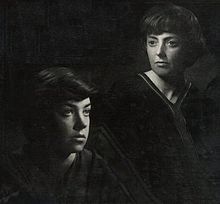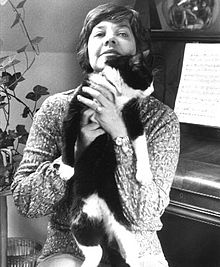- María Elena Walsh
-
María Elena Walsh 
Famous portrait of Maria Elena Walsh by her partner and photographer Sara Facio, which she later intervened with paint.Born 1 February 1930
Ramos Mejía, Buenos Aires, ArgentinaDied 10 January 2011
Buenos Aires, ArgentinaOccupation Novelist Author, Singer-songwriter, Poet Nationality Argentine Genres Children's literature, Autobiographical novel, poetry Partner(s) Sara Facio
me.gov.arMaría Elena Walsh (1 February 1930 – 10 January 2011) was an Argentine poet, novelist, musician, dramaturge, writer and composer, mainly known for her songs and books for children.
Contents
Biography
María Elena Walsh was born in Villa Sarmiento, Ramos Mejía, Buenos Aires, to an English railway worker, of Irish descent, who played the piano and an Argentine woman of Andalusian descent. As a child, she lived in a big house, where she greatly enjoyed reading and listening to music in a cultural environment.
When she was 15, Walsh had some of her poems published in El Hogar magazine and La Nación newspaper. In 1947, before graduating from art school, she published her first book, Otoño Imperdonable, a collection of poems which was critically acclaimed and received recognition from important Latin American writers.
After graduation in 1948, she traveled to North America invited for poet Juan Ramon Jiménez and Europe during the Peronism and then moved to Paris where she spent four years in the early 1950s. While there, Walsh performed in concerts featuring Argentine folklore with fellow Argentinean singer Leda Valladares (born 1919), forming the duo Leda & Maria and recording for Le chant du monde.[1]
She returned to Argentina in 1956 after the Revolución Libertadora. In 1958, Walsh wrote numerous TV scripts, plays, poems, books and songs, specially for kids, her stories and songs are highly poetic and entertaining. Her most famous song was “Manuelita la Tortuga” (Manuelita the Turtle) and the Twist of the Monkey Mono Liso. She triumph as a performer too, singing her songs onstage in 1962 (Canciones para mirar) and 1968, Juguemos en el mundo, a show dedicated to grown-ups very critical of the government censorship,[2] recordings and made a film Let's play in the world [3] based on her characters Doña Disparate y Bambuco directed by her partner at that time, Maria Herminia Avellaneda (1933–1997).
Her work has often contained an underlying political message, as in the song El País del Nomeacuerdo ("The Country of IDontRemember"), which was later used as the theme song for The Official Story, winner of the 1985 Academy Award for Best Foreign Language Film.
During the military dictatorship (1976–83) she was a fierce opponent, her song "Oración a la justicia" (Prayer for Justice) became a civil right anthem. In an open letter she criticized the regime censorship comparing the country with a preschool country calling it "Desventuras en el Pais-Jardin-de-Infantes" (Misadventures in the Preschool Country).
In 1985 she received the title of Illustrious Citizen of the City of Buenos Aires, and in 1990 was named Doctor honoris causa of the National University of Cordoba and Illustrious People of Buenos Aires Province as well.
In 1991 she was given the Highly Commended ranking in winning the Hans Christian Andersen Award, a prize awarded by the International Board on Books for Young People.
She was 80 when she died in Buenos Aires on 10 January 2011, after suffering from bone cancer. She lived with her partner, the photographer Sara Facio (born 1932) from 1980 until her death.[4][5]
Work
Books
- Otoño imperdonable - 1947 ("Unforgivable Autumn")
- Apenas viaje - 1948 ("As Soon as I Travel")
- Baladas con Ángel - 1951 ("Ballads with Angel")
- Casi milagro - 1958 ("Almost a Miracle")
- Tutú Marambá - 1960
- El reino del Revés - 1964 ("The Upside-Down Kingdom")
- Zoo loco - 1964 ("Crazy Zoo")
- Hecho a mano - 1965 ("Hand Made")
- Dailan Kifki - 1966
- Cuentopos de Gulubú - 1966 ("Tales of Gulubú")
- Aire libre - 1967 ("Open Air")
- Juguemos en el mundo - 1970 ("Let's Play in the World")
- El diablo inglés - 1974 ("English Devil")
- Angelito - 1974 ("Little Angel")
- El país de la Geometría - 1974 ("The Country of Geometry")
- La Sirena y el Capitán - 1974 ("The Mermaid and the Captain")
- Cancionero contra el mal de ojo - 1976 ("Songbook Against the Evil Eye")
- Chaucha y palito - 1977 ("Little to Nothing")
- Desventuras en el País-Jardín-de-Infantes - 1979 ("Misfortunes in Kindergarten-Country")
- Novios de antaño - 1990 ("Lovers of Yore")
- Hotel Pioho's Palace - 2002 ("Louse's Palace Hotel")
Albums
- Canciones para mirar ("Songs to Look At")
- Canciones para mí ("Songs for Me")
- El País del Nomeacuerdo ("The Country of IDontRemember")
- El País de la Navidad ("The Country of Christmas")
- Cuentopos ("Storiettes")
- Cuentopos para el recreo ("Storiettes for Recess")
- Juguemos en el mundo ("Let's Play in the World")
- Juguemos en el mundo II ("Let's Play in the World II")
- El sol no tiene bolsillos ("The Sun Has No Pockets")
- Como la cigarra ("Like the Cicada")
- El buen modo ("The Good Way")
- De puño y letra ("Handwritten")
References
External links
Categories:- 1930 births
- 2011 deaths
- 20th-century novelists
- 20th-century women writers
- 21st-century novelists
- 21st-century women writers
- Argentine composers
- Argentine female singers
- Argentine people of English descent
- Argentine people of Irish descent
- Argentine singers
- Argentine writers
- Cancer deaths in Argentina
- Children's writers
- Deaths from bone cancer
- Diarists
- Illustrious Citizen of Buenos Aires
- Lesbian musicians
- Lesbian writers
- LGBT composers
- LGBT people from Argentina
- People from La Matanza
Wikimedia Foundation. 2010.


